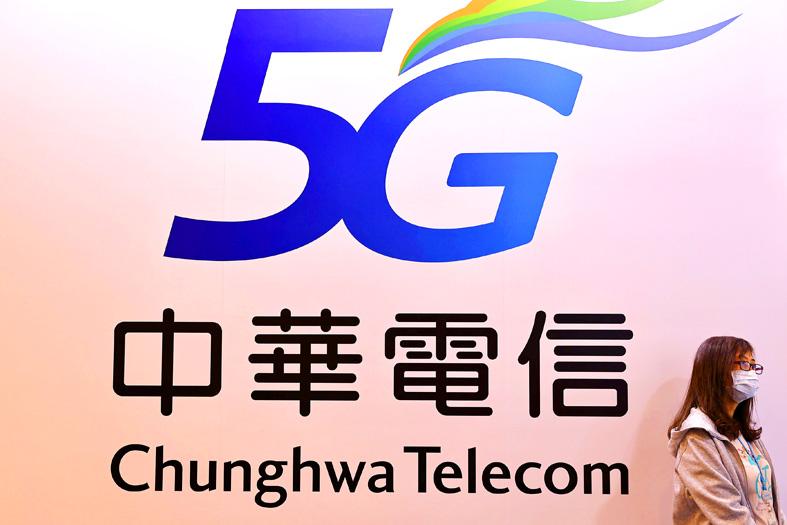Less than six months after the launch of 5G services, the number of users in Taiwan has surpassed 1 million, statistics released by the nation’s telecoms showed.
Taiwan in June issued its first 5G license to Chunghwa Telecom Co (中華電信), and the company started its services in July.
Four other telecoms — Far EasTone Telecommunications Co (遠傳電信), Taiwan Mobile Co (台灣大哥大), Taiwan Star Telecom Corp (台灣之星) and Asia Pacific Telecom Co (亞太電信) — soon followed suit to start 5G services in the summer.

Photo: Ann Wang, Reuters
Chunghwa Telecom said that its number of 5G subscribers has topped 300,000 and would likely rise to 500,000 by the end of this year.
Subscriptions to 5G services have exceeded the firm’s expectations, as it has previously aimed to sign up 300,000 users by the end of the year, the company said.
Chunghwa Telecom would invest more than NT$10 billion (US$351.62 million) next year to improve its mobile communication infrastructure, Chunghwa Telecom chairman Sheih Chi-mau (謝繼茂) said.
So far, Chunghwa Telecom has built more than 4,000 5G base stations, Sheih said.
Far EasTone has signed up about 300,000 5G subscribers since the launch of its services in July, topping the company’s expectations, the company said.
Far EasTone president Chee Ching (井琪) said that the company is determined to strengthen its 5G infrastructure to gain a greater market share.
Taiwan Mobile has also signed up about 300,000 5G users, exceeding its expectations of the number of people who quickly adopted the new technology, the company said.
Taiwan Mobile expects that 5G users would account for 15 to 20 percent of its total subscribers by the end of next year, Taiwan Mobile president Jamie Lin (林之晨) said.
Taiwan Star Telecom and Asia Pacific Telecom each signed up more than 100,000 5G subscribers, statistics released by the respective companies showed.

In Italy’s storied gold-making hubs, jewelers are reworking their designs to trim gold content as they race to blunt the effect of record prices and appeal to shoppers watching their budgets. Gold prices hit a record high on Thursday, surging near US$5,600 an ounce, more than double a year ago as geopolitical concerns and jitters over trade pushed investors toward the safe-haven asset. The rally is putting undue pressure on small artisans as they face mounting demands from customers, including international brands, to produce cheaper items, from signature pieces to wedding rings, according to interviews with four independent jewelers in Italy’s main

Macronix International Co (旺宏), the world’s biggest NOR flash memory supplier, yesterday said it would spend NT$22 billion (US$699.1 million) on capacity expansion this year to increase its production of mid-to-low-density memory chips as the world’s major memorychip suppliers are phasing out the market. The company said its planned capital expenditures are about 11 times higher than the NT$1.8 billion it spent on new facilities and equipment last year. A majority of this year’s outlay would be allocated to step up capacity of multi-level cell (MLC) NAND flash memory chips, which are used in embedded multimedia cards (eMMC), a managed

Japanese Prime Minister Sanae Takaichi has talked up the benefits of a weaker yen in a campaign speech, adopting a tone at odds with her finance ministry, which has refused to rule out any options to counter excessive foreign exchange volatility. Takaichi later softened her stance, saying she did not have a preference for the yen’s direction. “People say the weak yen is bad right now, but for export industries, it’s a major opportunity,” Takaichi said on Saturday at a rally for Liberal Democratic Party candidate Daishiro Yamagiwa in Kanagawa Prefecture ahead of a snap election on Sunday. “Whether it’s selling food or

In the wake of strong global demand for AI applications, Taiwan’s export-oriented economy accelerated with the composite index of economic indicators flashing the first “red” light in December for one year, indicating the economy is in booming mode, the National Development Council (NDC) said yesterday. Moreover, the index of leading indicators, which gauges the potential state of the economy over the next six months, also moved higher in December amid growing optimism over the outlook, the NDC said. In December, the index of economic indicators rose one point from a month earlier to 38, at the lower end of the “red” light.